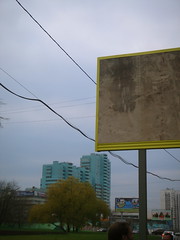A smell of urine hits you as you take the steps down to the underpass. The tunnel is swamped with people selling electronics, kitsch souvenirs, pastries and alcohol. As we make our way through the gates down to the metro, the numbers from the presentation earlier during the day hit me: 9 million passengers in public tranport every day. This is Moscow.
And this is only the people who choose for public transport. In the information pack from the British Council they instruct us to head to the airport four hours before departure. It seems absurd but already on the way into the city upon arrival it starts making sense. Two hours moving on snail speed for something like 20 kilometres.
During a presentation by a young architectural office we see fancy designs for gated communities and ski slopes on the rooftops of shopping centres. One of them looks a lot like Rem Koolhaas´ star architecture in China. The smooth PowerPoint presentation makes me think of the demand by lecturer Roy van Dalm: a future plan of a city needs to be authentic, it needs to link to the city´s DNA.
We cannot all become Bilbao or Amsterdam. It is not the right answer for the struggles of Moscow to copy an internationally famous architectural plan when the city is barely coping with its amount of traffic and the thousands of homeless people. Copying others results only into being a second-rate version. An answer to Moscow´s challenging is not starting from scratch, it is seeing how people can start imagining a new sense of being together building on the history of the city. In other words, how Moscow can become a better Moscow. In order to build a community, you need to give citizens the possibility to continue and enhance their individual experience of Moscow.
I would not trust governments to come up with this new imagination. I have seen two many cities proclaiming themselves as the creative capital. But I do feel that you need artistic and activist interventions to stimulate seeing common things in a quirky manner. You need positive engagement and a bit of silliness even in a form of a apartment block bingo or guerilla gardening. This does not mean wasting a lot of money on star architects, it means change in the IKEA style: giving people affordable access to imagination stimulates them to start experimenting with new looks and feelings. Moscow needs the attitude of guerilla gardener Richard Reynolds: I can do this too. I can change Moscow.
Subscribe to:
Post Comments (Atom)













2 comments:
to continu on Roy's line of thinking:
if moscow were to be a person, how would you describe him (because Moscow is certainly not a she...)?
thanks for your blog
e
Nice blog thanks for pposting
Post a Comment